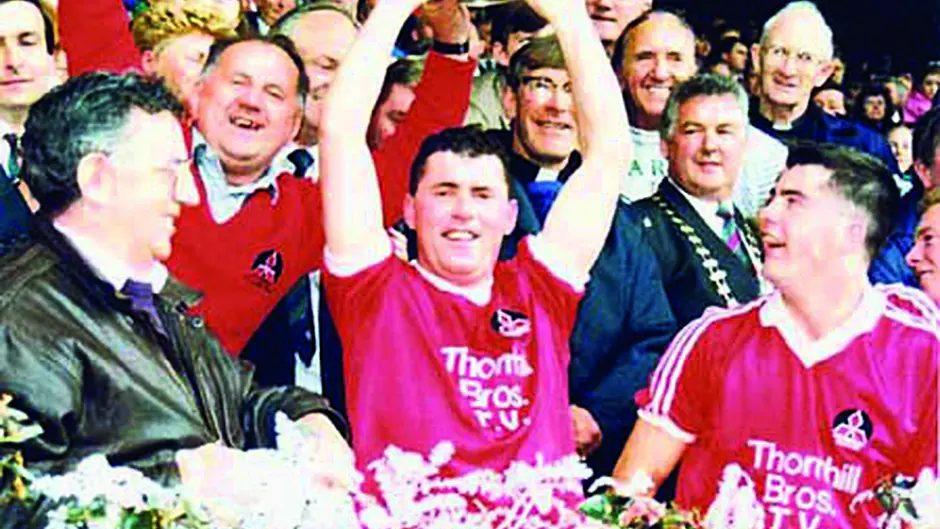O'Donovan Rossa footballer Mick McCarthy died tragically 20 years ago this week. DENIS HURLEY spoke to Tony Davis, Gene O'Driscoll and John Cleary to find out more about a talented forward whose popularity transcended the game
O’Donovan Rossa footballer Mick McCarthy died tragically 20 years ago this week. DENIS HURLEY spoke to Tony Davis, Gene O’Driscoll and John Cleary to find out more about a talented forward whose popularity transcended the game
DEADLINE constraints meant that, when The Southern Star hit the streets of West Cork on Thursday, February 5th,1998, the events on the cover had already been overtaken.
The Skibbereen notes on page 25 had somehow managed to squeeze in the horrific news which was on the lips of everybody in the area – former Cork footballer Mick McCarthy and his friend Jack Pat Collins had died on the Wednesday night following a road accident, en route home from the National Coursing Meeting in Clonmel.
About to turn 33, it was less than five years since McCarthy had led O’Donovan Rossa to its greatest day, victory over Éire Óg of Carlow in the All-Ireland Club SFC final replay in Limerick.
That victory was yet another garland to an honour-roll which can stand with any Cork footballer – three All-Ireland U21 medals from 1984-86, senior medals in 1989 and ’90 and of course captaining Skibb in their year of unprecedented, unrepeated, glory.
***************
The club actually achieved a clean sweep in Cork in the GAA ‘year’ of 1992, but the Kelleher Shield final against Bishopstown wasn’t played until the autumn of 1993. However, that game arguably provides the most fitting vignette of the man known as ‘small Mick’.
The mileage looked to be catching up on Skibb when they trailed Bishopstown by seven points with 20 minutes remaining in Clonakilty, and some of the local wags decided to have some fun.
‘The game started 40 minutes ago, Mick,’ and ‘Will we get a chair for you?’ were among the banter before he came to life. A goal with his right foot, a goal with his left foot, a goal from a 35m free and, finally, goal from a penalty and victory was assured. Quite satisfied, he turned to the chorus and asked, ‘Can I have that chair now, lads?’
***************
Tony Davis, three months older than McCarthy, solidered with him with the red of Skibb and the red of Cork, a shared journey dating all the way back to their first day in school in September 1969.
‘There were two Mick McCarthys in the class,’ he says, ‘so that’s how the ‘big Mick’ and ‘small Mick’ came about.
‘It was a good group of players all around the one age, we were coached by Dermot O’Donovan starting off, and, looking at the team that won the All-Ireland, a lot would have been drawn from that year and the year above.
‘You could tell straightaway that Mick had a special talent. Everyone knew he was the go-to player but he was still so hard to mark.
‘To judge a player, you have to see him at the very top level. Mick was tested in colleges finals, county finals, All-Ireland finals at club and county level, and he was never ever found out.’
Underage titles were collected as a matter of course, and at adult level Skibb quickly became established in the senior grade.
When Gene O’Driscoll took over as manager in the early 90s, he didn’t have any doubts when it came to choosing a captain.
‘Mick was a larger-than-life character and he arguably had more friends outside the game than within it, he was very popular,’ he says.
‘He was like a magnet, his enthusiasm was infectious and he had a great way about him. Making him captain was sort of a no-brainer, he inspired everybody else by his performances on the pitch.
‘I suppose Mick wouldn’t have been the greatest guy in the world to train, but he never failed to deliver on the pitch. It was a simple decision to make him captain.
‘Under his leadership, he wanted to knock the most out of the group. He did this by actions on the pitch – “If I’m the captain and I’m prepared to do it, I’d expect you to do it”.
‘The gameplan was simple – move it quickly from wherever we picked it up and get it in to Mick as quickly as we could.
‘That never changed, from game one of that season to the All-Ireland final replay in Limerick.’
By that stage, he had of course earned his stripes with Cork, with manager Billy Morgan holding him in high esteem, perhaps seeing something of himself in Mick’s roguery.
One of his partners in crime was Castlehaven’s John Cleary, with whom he first became acquainted in St Fachtna’s.
‘Cork were successful back then and there would have been quite a few away trips,’ Cleary says, ‘so we found ourselves rooming together quite a lot.
‘We were in contention for the same place a lot of the time and the Skibb-Haven rivalry would have been very strong, but that never affected our friendship.
‘There were some great nights and singsongs and Mick was always at the centre of them. Crucially though, we were always able to back that up with performances on the field.’
Davis believes that playing for Skibb brought out something extra in McCarthy.
‘Mick may not have been the quintessential serious trainer, but he got huge scores in every game,’ he says.
‘He never left Skibb, he worked there with South of Ireland Petroleum and I think the passion for the area, the people and the club brought out something more in Mick.
‘In the All-Ireland club final in Croke Park, he single-handedly drew the game for us, we got 1-12 and he scored 1-8. Without a shadow of a doubt, without him we’d have lost.
‘That, to me, was his best performance.’
Cleary paints a picture of someone who withstood what was thrown at him and never wilted.
‘He had supreme confidence in himself and he was very accurate,’ he says.
‘There were a lot of times he pulled games out of the fire for Skibb and he had some very good games with Cork.
‘Neither of us would have been the biggest and we came in for some rough treatment, but he was never fazed by it.’
Davis believes that Cork and Skibb were lucky to have had a player like McCarthy, but also that he was lucky to play when he did.
‘The game has stripped players of their personal identity now,’ he says.
‘Mick’s individuality made him what he was, and that’s stifled now. He had a very unusual sidestep to get away from his man, I can see it in my mind’s eye. If he got ball within two steps of making the run, God nor man couldn’t get it off him, it was a score or a foul.
‘Billy recognised that he was a special player, they were similar in spirit.’
Such a death casts a shadow over a region, but it also means that the deceased remains forever young. In the collective memory, McCarthy remains in full flight in a red jersey, but Davis is quick to point out that the loss extended far beyond sport.
‘You talk about missing him, whatever about as a footballer, he was a huge loss to his family, as a husband and a dad,’ he says.
‘It was so sad, Stephen was only three but has turned out to be a great sportsman and man. It was so tough for Helen, but she’s married now again, to Dr O’Shaughnessy.
‘It was a massive loss to Skibbereen and the area, he was such a character, stuck in every bit of craic that went on.’
O’Driscoll sums it up.
‘Even though it was 20 years, it only feels like yesterday,’ he says.
‘The easiest way of describing his impact is that Skibb wouldn’t have won the All-Ireland without him.’










